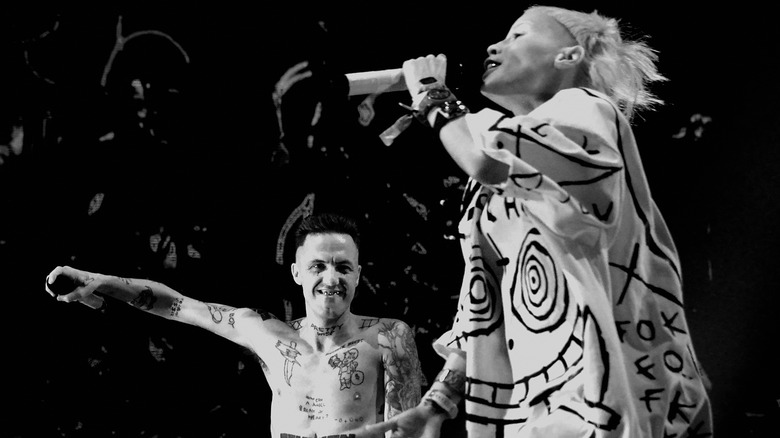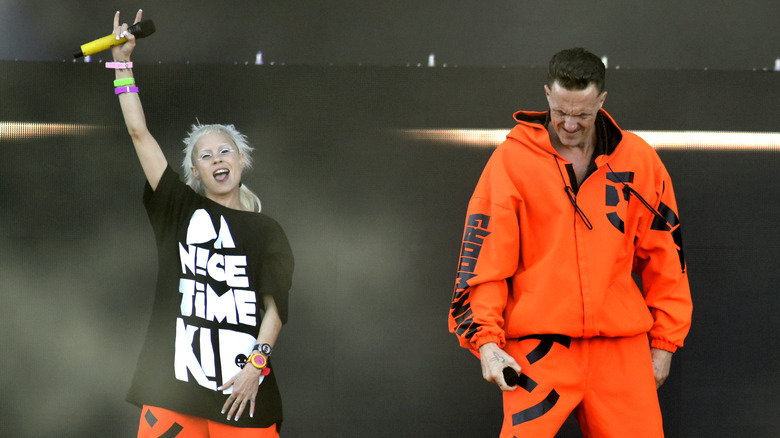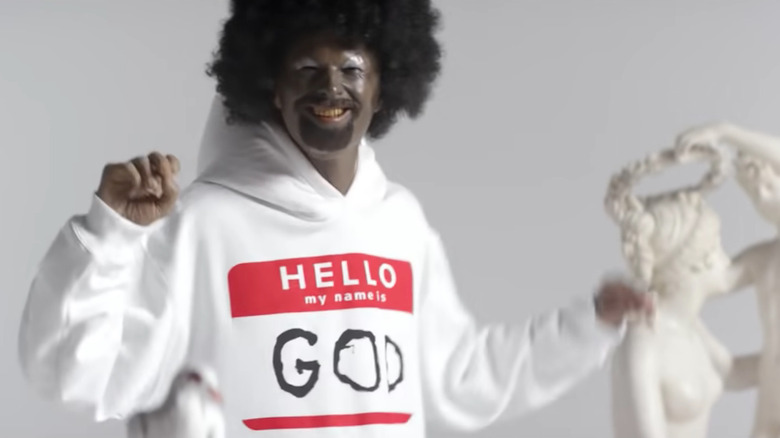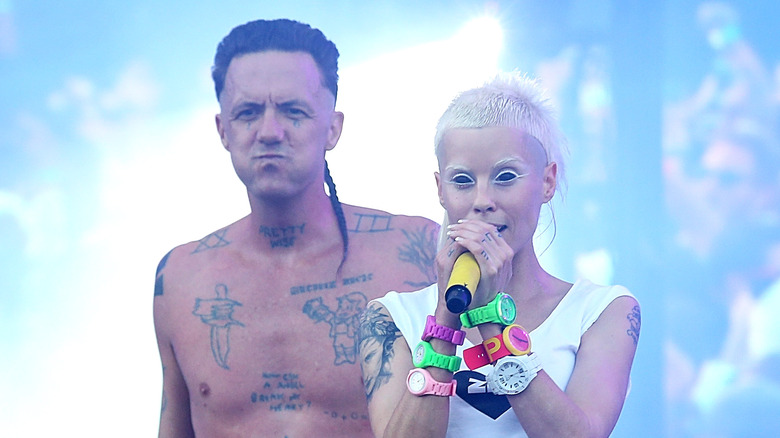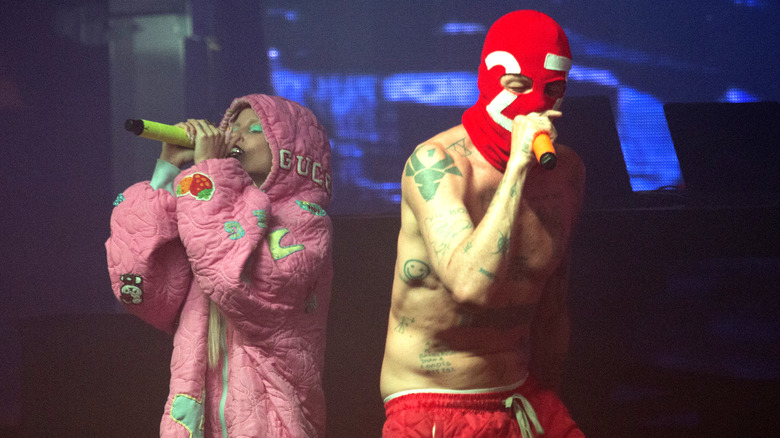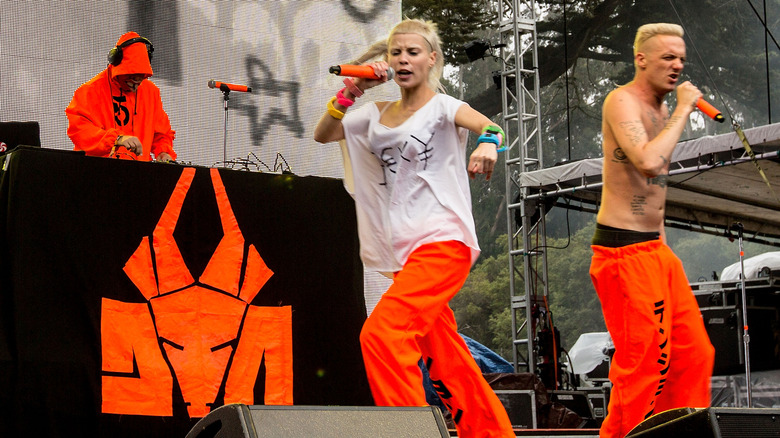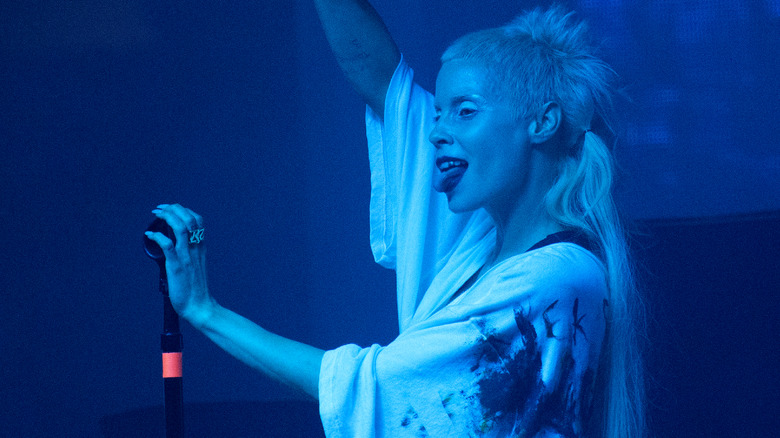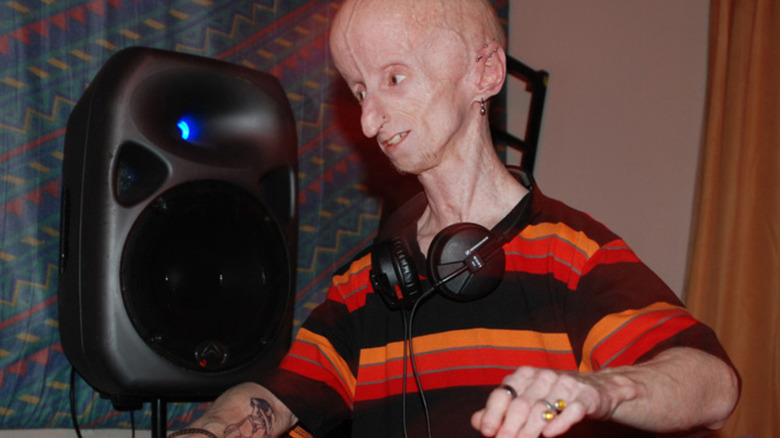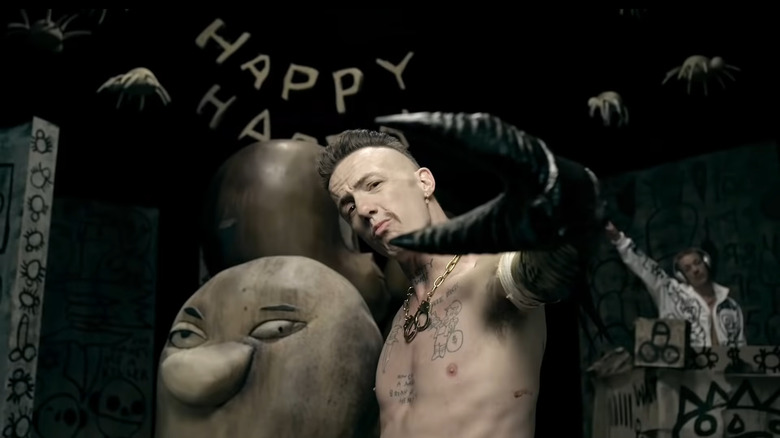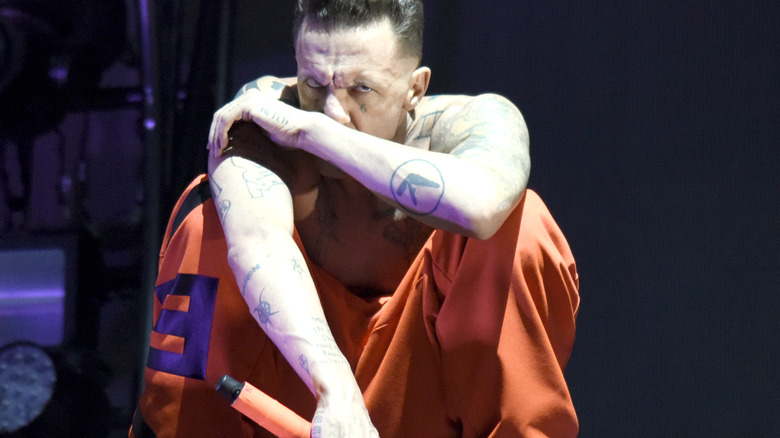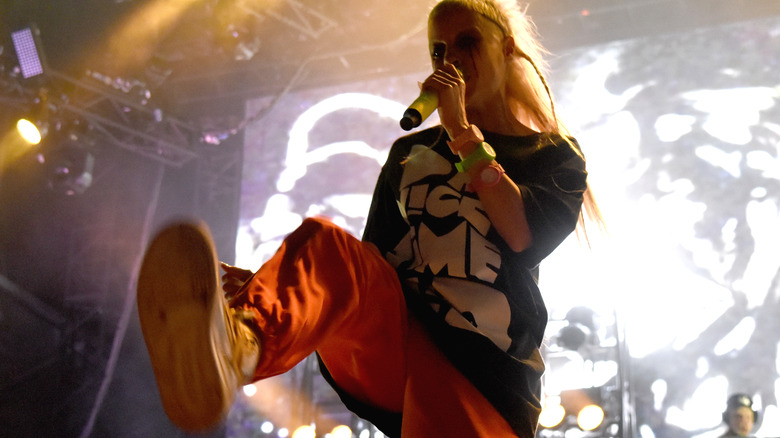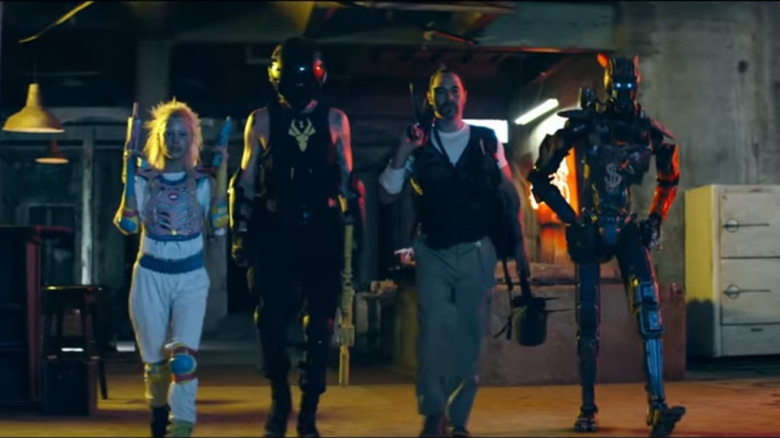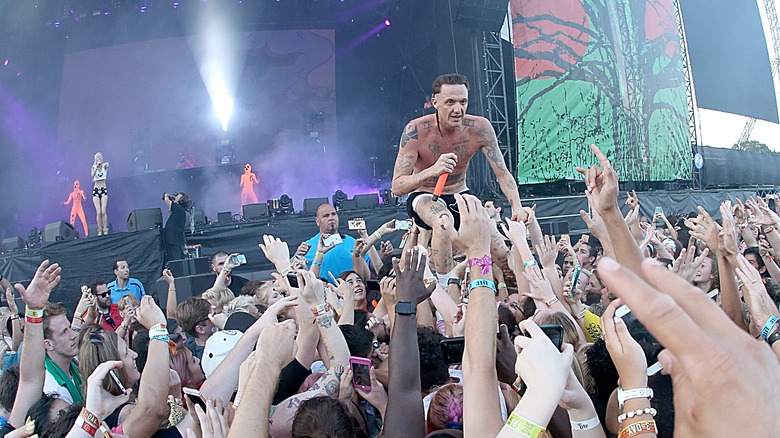The Untold Truth Of Die Antwoord
Die Antwoord are a South African band that has become internationally famous for their shocking and sometimes bizarre visuals, rave-techno-infused rap songs, and lyrics laced with Afrikaans and cursing. The controversial band has described themselves as "punk and fresh and kind of psycho."
The band's intimidating, tattooed frontman is known as Ninja, and its waifish, silver-haired frontwoman is called Yo-Landi Visser. In real life, the two were a couple who have a child together, but in videos they have depicted their relationship as everything from an adolescent crush to siblings. The two view their onstage personas as characters that they play. As explained by Ninja in an interview with Dazed, "We transformed into these new, hyper, upgraded versions of our old selves."
Yo-Landi added rave to Ninja's rap, and combined with DJ Hi-Tek's beats, they created the sound that would go viral. As stated in Spin, the band blew up practically overnight.
The origins of Die Antwoord
Hailing from South Africa, Die Antwoord is a rap-rave musical act that was formed in Cape Town in 2008, per Music in Africa. The name of the group translates to "The Answer," in the Dutch-based South African language of Afrikaans. Their music is described as heavily opinionated, suggestive, and highlighting "Zef" culture — a term used to represent working-class white South Africans. The act consists of the main duo: Anri du Toit, who is known as Yolandi Visser, and Watkin Tudor Jones, who goes by his stage name Ninja. Also, part of the group is DJ Hi-Tek.
Die Antwoord made their international debut in 2009 with the release of their album "$O$." The first music video for their album single, "Enter the Ninja," was a popular and viral success, and it gained them a decent amount of global recognition. So much that not long after their introduction into the music world, the pair inked a deal with an American music label, Interscope Records. But it was a short-lived agreement, and they left to create their own label. Despite being an up-and-coming group at the time with a growing fan base, the duo quickly found themselves in hot water when a 2012 video sparked backlash and criticism for being racist.
Die Antwoord sparks racist controversy after racist controversy
The video for their song "Fatty Boom Boom" (posted on YouTube) from their sophomore album titled "Ten$ion," depicts Yolandi in blackface — a historically racist depiction that caricatures Black people with minstrel show stereotypes. The video was praised for effectively parodying Western culture, according to The Guardian, but the use of blackface reverted any other clever metaphors. That video, however, wouldn't be the last time Die Antwoord earned criticism for racism.
In another video released in 2014, the group did blackface again. The visuals for the song "Ugly Boy," (also on YouTube) includes a man not only in blackface but sporting an Afro wig, too. The man is also wearing a hooded sweatshirt that reads, "Hello my name is God." The video had quite a few notable celebrity cameos (via Complex) but again, like the previous video, the blackface did not go ignored. So very early on the group had a reputation for being racist, notwithstanding the overall criticism for allegedly biting off colored, Black, and working-class white South African cultures — groups that neither member is apparently a part of, as explained in this OkayAfrica op-ed. But that would not be the end of more issues the troubling duo sparked. They routinely created controversy with their visual images and used a racial slur in a song, per HuffPost UK.
The sexual assault case against Ninja
Aside from their music and videos, Die Antwoord soon found themselves reportedly committing more offenses. In 2019, Australian artist Zheani Sparkes came forward about her relationship with group frontman Ninja after filing a police report against him, says the Sydney Morning Herald. The trio initially made contact when Yolandi first messaged her in 2013 — the same year Yolandi and Ninja called their romantic relationship quits and decided to remain together solely as music partners. The duo also have a teenage daughter together.
That year, Ninja allegedly began aggressively pursuing Sparkes, and when she flew to South Africa to meet him, she says she was drugged with a spiked drink. She said the rapper sexually violated and physically assaulted her to the point that she blacked out and lost consciousness. She released a song (posted on YouTube) about the assault, also accusing Ninja of having incestuous fantasies. Not long after Sparkes' story, another singer named Dionna Dal Monte, came out and accused Ninja of also assaulting her in Italy.
If you or anyone you know has been a victim of sexual assault, help is available. Visit the Rape, Abuse & Incest National Network website or contact RAINN's National Helpline at 1-800-656-HOPE (4673).
Die Antwoord's alleged homophobic attack
It would not just stop there. Sparkes also accused the pair of trafficking and grooming her in South Africa. Yolandi responded to the claims on Instagram a few months after and blasted Sparkes for being an attention seeker, reported All 4 Women.
Around that same time, a 2012 video of the duo engaged in a physical spat with music DJ Andy Butler spread online (via Mix Mag). Yolandi was heard using a homophobic slur and Ninja was seen assaulting him. The group had been set to appear in a few music festivals that year but was subsequently dropped from them when the video came out. A member of their entourage also involved in the assault later apologized to Butler for his role in the attack, and even blamed the duo for his actions, per Louder. Ninja would say the attack was warranted by Butler apparently groping Yolandi (via Grit Daily).
If you or a loved one has experienced a hate crime, contact the VictimConnect Hotline by phone at 1-855-4-VICTIM or by chat for more information or assistance in locating services to help. If you or a loved one are in immediate danger, call 911.
Die Antwoord's repeated offenses year after year
The constant controversies, and the most recent being a homophobic attack caught on tape, was just another major blow to a group that's already been embroiled in so many problematic issues just over a decade since their formation. Die Antwoord has seemingly and continuously left a bad taste in the mouths of many, and it shouldn't be any wonder why despite having a low profile for most of 2020, their past dealings have still followed them into this year. Last year the group released new music and was invited to perform at Lollapalooza Berlin, per Mxdwn.com.
But of course them moving on from previous controversies doesn't erase them in the collective minds of others. That is exactly what happened a few days ago, when British artist Bobby of the punk rap duo Bobby Vylan, vehemently objected to Die Antwoord being listed in the lineup of the same festival they're set to perform in (via Louder). The ALT+LDN festival is just the most recent event to drop the rap duo, and by now, they're probably used to this.
Die Antwoord is famous for their videos
Die Antwoord's first hits were viral music videos: "Zef Side" and "Enter the Ninja." It's not hard to see why their videos were so popular. They frequently pair their music with bizarre and surreal imagery that pushes up against taboos. As Yo-Landi told Spin, "The more you push boundaries, the more you get ahead."
They are frequently met with questions about whether or not the band is real, or if they are joking. According to them, that's asking the wrong question. It's all about changing identities — and authenticity doesn't matter as long as it's exciting. They intend to shock and fascinate with their videos. Ninja explained, "People are unconscious and you have to use your art as a shock machine to wake them up."
Their videos frequently are extreme, disturbing, and inexplicable — which doesn't keep them from being fun and entertaining. Some videos, like "Cookie Thumper," depict a grimy world dominated by gangs and drugs (in this case being navigated by naïve but rebellious schoolgirl Yo-Landi). Others have a distinctly magical realism style, like "Ugly Boy," in which Yo-Landi has pure white skin and disturbing black bug eyes, and sits on Ninja's lap on a throne with crow wings. As described by Rolling Stone, "Pitbull Terrier" stars Ninja in extremely unsettling hairless dog makeup. "Evil Boy" was once described by MTV as "the most NSFW video in the history of the medium."
Die Antowoord collaborated with artist Leon Botha
One of Die Antwoord's first videos was "Enter the Ninja," which was a collaboration with South African artist and DJ Leon Botha. As stated by HuffPost, he also often opened Die Antwoord's shows, under the name DJ Solarize. Internationally, he is most known for his cameo in their video, but he was also an acclaimed visual artist, making work that explored questions of self and mortality.
Botha, who died in 2017, had a rare condition called progeria, which causes extremely rapid aging. The majority of those with the condition don't survive past 13, but Botha lived to be 26 years old.
Although he is now best remembered as a DJ, Botha was primarily a fine artist. After his death, the band released a statement (quoted via BoingBoing) describing Botha's work as, "beautifully dark and mysterious." In a collaborative exhibition, photographer Gordon Clark filmed scenes of "Who Am I? ...Transgressions," with Botha discussing philosophy. On a personal level, the members of the band were particularly influenced by Botha's unique take on life, describing him as "the deepest person we have ever met."
The Evil Boy video has a message
The "Evil Boy" video may have been described by Billboard as "extremely graphic and disturbing," but the imagery in the video isn't just there for shock value. The group teamed up with South African rapper Wanga, who is a part of the Xhosa tribe. As described by Ninja in Pitchfork, Wanga's lines in the song are actually about a cultural circumcision practice that he was expected to go through at 19.
Wanga had already been a friend of Ninja's since they were young. According to Ninja, when it came time for him to participate in a cultural tradition in which young men are expected to spend a week in the bush with nothing but a blanket prior to circumcision, he went to Ninja for advice. According to Ninja, more than 60 teens had died that year because of poor sanitation during the circumcisions, so Wanga decided not to go through with it, even if it would make him, "Evil Boy for life." The lyrics have sometimes been interpreted as homophobic, but Ninja has stated that the lyrics are not intended to insult LGBTQ+ people, but instead take aim at the apparent hypocrisy of homophobic men fixating on the genitals of young people.
They're creating a zef movement
Die Antwoord created a zef movement, but the band's frontman Ninja balked at the idea of it being a culture. He told Dazed, "There was no zef movement before we came along. It was an insult."
The New York Times refers to zef as "gleefully trashy," and it has been likened to the American definition of "white trash" or "redneck," but as described by the band for Mother Jones, zef refers to a kind of flashy style that appeared in poor white communities in South Africa. Ninja described it as a combination of styles that reached South Africa, saying: "It's ... kind of like this apocalyptic debris that we've stuck together ... It's not having money, but still ... having style."
Ninja might now be considered an expert on all things zef, but it was actually Yo-Landi who taught him Zef slang. Yo-Landi has said that Ninja was the one who cut her hair into her iconic wispy mullet, giving her a more zef style that the band would become known for. Although Die Antwoord introduced the idea of zef style to the world, Ninja told Pitchfork that it (and a lot of what they do) is hard for people who aren't from South Africa, particularly Americans, to understand.
They have celebrity friends and feuds
Die Antwoord has had some strange interactions with other musicians throughout their career — but they have also brought many stars into their music and videos. The "Ugly Boy" video is particularly packed with celebrity cameos, featuring model Cara Delevingne, burlesque star Dita Von Teese, and actor Jack Black among others.
Their most public celebrity diss came when the band felt that they had been insulted by an offer to open for Lady Gaga (via Billboard). They released a video for their song "Fatty Boom Boom" which features an actor clearly supposed to be Lady Gaga (wearing her famous meat dress) as a tourist in Africa, in which she finds Die Antwoord exotic and cute, before being mugged and eaten by a lion.
Other conflicts with celebrities have been exaggerated. In an interview with Vice, Ninja recounted how he and Yo-Landi were disappointed by Drake's live show, so as a joke he posted a meme insulting Drake to Yo-Landi's Instagram. The story was quickly picked up by music news magazines, believing that there was a feud between Die Antwoord and Drake — whom they were currently touring with. However, there was never any serious drama between them — in fact, when Ninja went to Drake's house to play basketball with Kanye West (whom Ninja would eventually block because he "got a little bit weird”) it seemed like Drake didn't even know about the post.
Yo-Landi and Ninja starred in a sci-fi film
In 2015, Die Antwoord appeared in a science fiction movie called "Chappie." Yo-Landi and NInja play even more heightened versions of their onstage personas, who take possession of a police robot and raise the child-like AI to assist them in heists.
As described by writer and director Neill Blomkamp in Wired, the band was a part of the concept from the beginning. While working on the film "Elysium," Blomkamp was listening to a lot of Die Antwoord, and the combination gave him the idea for "Chappie."
Since then, Ninja blasted the film's art director, because he believes that the band, which was featured in the first concept art, deserved credit for the look of the film (via Pitchfork). As noted by Pitchfork, this is not the first time Die Antwoord has felt that their unique style was used without credit. They also claimed that "Suicide Squad" used Ninja and Yo-Landi as inspiration for the film's interpretation of the Joker and Harley Quinn.
They were worried they wouldn't be able to make music in the U.S.
The band, which is controversial in its home country of South Africa, feared that their music wouldn't work abroad. Ninja explained in an interview with Pitchfork that American music and culture are popular internationally, but far less people outside of the country are familiar with South African culture. Many international fans are learning about the imagery and language that they use in their music videos for the first time.
One example of these culturally specific references is the horned monster that appears in the "Evil Boy" video. According to Ninja, it is supposed to represent the terrifying Tokoloshe demon — a creature that a witch doctor sends to bring misfortune on someone but is invisible to adults. Similarly, Wanga's rap begins with a phrase in the Xhosa language that is incredibly taboo.
In an interview with the New York Times, both Yo-Landi and Ninja recalled that they were concerned not just about how their work would be received, but their own creative process changing in America. The two described how their usual way of working on new songs was to wander the streets of Cape Town, writing down lyrics as they came to them. They described Los Angeles as "sterile" and "organized," but they were finally convinced to move to LA to collaborate with Cypress Hill's DJ Muggs.
